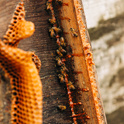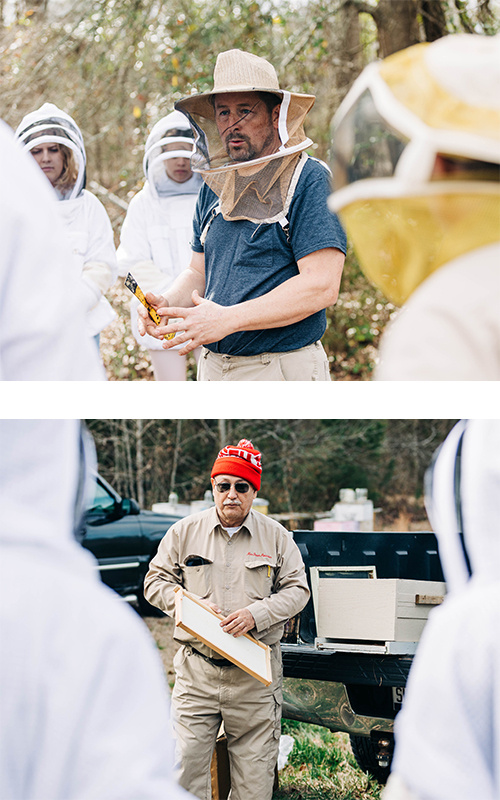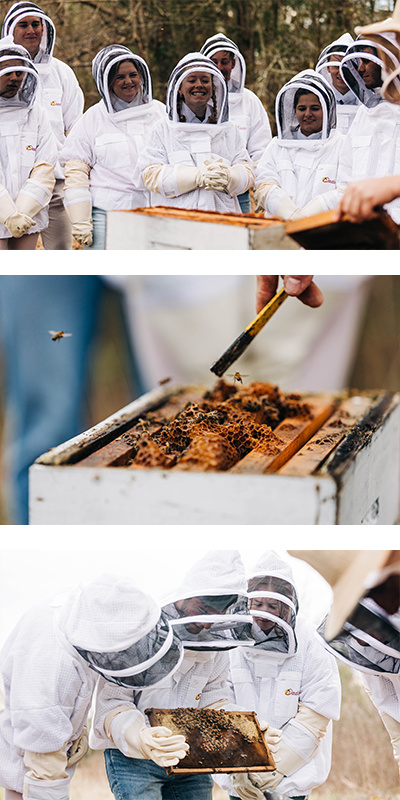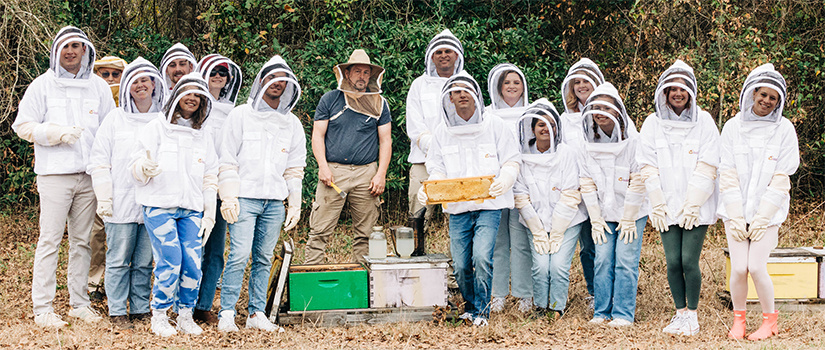Lessons from the hive – South Carolina Honors College

Before visiting the beehives, Jack Pitstick receives a list of tips and tricks to
avoid being stung. It contains things like wearing light-colored and loose-fitting
clothing, using a smoker to help calm the bees and not eating bananas (they smell
too similar to bees’ alarm scent). It’s a list Pitstick never envisioned himself reading.
“It was crazy. I mean, I had never, ever done anything like that or ever thought I
would,” Pitstick says. “But the moment that I put on that suit and got to see all
the stuff and see the complexities and how niche of a subject it actually is, it was
so cool to learn about.”
Through the Honors College’s Lessons from the Hive: Creative Writing and the Practice of Beekeeping, the junior biology major says he gets a chance to branch outside of his comfort
zone.
“I’m used to writing all these lab reports that are very technical. And like I had
to give all these, this sort of nitty-gritty information,” says Pitstick. “(The class)
really forces me to think about things in a different way and sort of analyze situations
differently than I normally would. And because of that, it’s been a really enlightening
experience.”

Creative writing professor James Barilla, Ph.D. is the author who leads the class in combination with an expert beekeeper. Barilla
encourages students to discuss bees in both a creative and practical sense. Throughout
the semester, students read a mix of nonfiction and creative work, ranging from work
by bee biologist Thomas D. Seeley, Ph.D. to poetry by Sylvia Plath.
“How could we translate the kind of technically specific language and ideas from this
beekeeping context into kind of poetic context?,” Barilla wonders. “So moving back
and forth between those two different paradigms.”
Barilla pushes his students to go beyond the text and to think critically about their
relationship with nature. They often participate in in-depth discussions and creative
writing assignments on topics ranging from community to “the wild.”
“When he gave us our first assignment, I was looking at this problem, like, ‘What
the heck am I going to do?’” Pitstick says. “This is nothing up my alley. I’ve never
done anything like this. And it was focused on that central idea of writing about
an experience that you had where you really discovered yourself through the lens of
nature or in the wild.”
Pitstick said he wrote a fiction story about an encounter with a wild turkey that
helped him analyze how he has matured through nature.

“It really made me more introspective about my own life and about how I sort of taken
nature for granted in the past,” Pitstick says.
Multiple times throughout the semester, students get the chance to visit the hives
in person and learn about the process of caring for bees. Students are encouraged
to take a hands-on approach, putting on suits and holding the bees.
For many students, it helps them gain a broader perspective of bees’ impact on the
community and world.
“We take so much of this for granted,” Pitstick says. “I mean, these things, these
little tiny fuzz balls that fly around are really the source of most of our food in
this world. So those discussions about like, ‘Hey, like, what would happen if XYZ
disappeared? Or what would happen if we didn’t live with this anymore?’”
Barilla says he hopes that by the end of the semester, students will have a head start
on learning to run a hive in their community, but more importantly, that they take
away a deeper understanding of the natural world.
“There’s other species involved in my own welfare,” Barilla says. “What can I be doing
to promote that kind of engagement with the ecological community and my standing as
a citizen within it?”
Pitstick says he encourages every Honors student to take advantage of this unique
opportunity.
“You’re never going to be able to do something like this once you graduate,” Pitstick
says. “You’re never going to do it in this capacity, where you’re also having these
beautiful, intense discussions with your peers. And also learning from your experience
with beekeeping and putting yourself out there to become a better person and become
more creative.”

Source link

